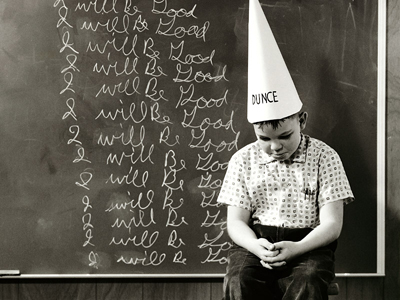 When it comes to religion, maybe not. Catholics, in particular, don’t understand the Eucharist at an alarmingly high rate. That, and more, according to the results of a new survey:
When it comes to religion, maybe not. Catholics, in particular, don’t understand the Eucharist at an alarmingly high rate. That, and more, according to the results of a new survey:
If you want to know about God, you might want to talk to an atheist.
Heresy? Perhaps. But a survey that measured Americans’ knowledge of religion found that atheists and agnostics knew more, on average, than followers of most major faiths. In fact, the gaps in knowledge among some of the faithful may give new meaning to the term “blind faith.”
A majority of Protestants, for instance, couldn’t identify Martin Luther as the driving force behind the Protestant Reformation, according to the survey, released Tuesday by the Pew Forum on Religion & Public Life. Four in 10 Catholics misunderstood the meaning of their church’s central ritual, incorrectly saying that the bread and wine used in Holy Communion are intended to merely symbolize the body and blood of Christ, not actually become them.
Atheists and agnostics — those who believe there is no God or who aren’t sure — were more likely to answer the survey’s questions correctly. Jews and Mormons ranked just below them in the survey’s measurement of religious knowledge — so close as to be statistically tied.
So why would an atheist know more about religion than a Christian?
American atheists and agnostics tend to be people who grew up in a religious tradition and consciously gave it up, often after a great deal of reflection and study, said Alan Cooperman, associate director for research at the Pew Forum.
“These are people who thought a lot about religion,” he said. “They’re not indifferent. They care about it.”
Some other details:
The Rev. David Poecking, director of the office of continuing education for clergy of the Catholic Diocese of Pittsburgh, said the survey confirms the Catholic church’s own findings that many adult Catholics are ill-informed about doctrine. Just 55 percent of Catholics knew the church teaches that consecrated bread and wine is the actual body and blood of Jesus. Most of the rest thought the communion elements were symbols.
“We’ve discovered that it’s hard to learn the intangibles of faith without first learning the tangibles,” he said, citing diocesan efforts to raise knowledge…
The bilingual survey interviewed 3,412 adults. Most questions were multiple choice. The average score was 16 of 32.
The highest number of people, 89 percent, knew that public school teachers can’t lead classroom prayers. But only 23 percent knew that public school teachers can read from the Bible as an example of literature.
Among other high scores: 85 percent knew that atheists don’t believe in God, 82 percent knew that Mother Teresa was Catholic and 71 percent knew that Jesus was born in Bethlehem.
About half knew that the Quran is the Islamic holy book, that Joseph Smith was Mormon and that the Jewish Sabbath begins on Friday. Less than one-third knew that most people in Indonesia are Muslim or that salvation through faith alone is a classic Protestant doctrine. The worst score was on whether the medieval theologian Maimonides was Jewish, Catholic, Buddhist, Hindu or Mormon. Just 8 percent of the public — but 57 percent of Jews — knew he was Jewish.
The survey was inspired by Stephen Prothero’s 2007 book, “Religious Literacy: What Every American Needs to Know — and Doesn’t.” Dr. Prothero, professor of religion at Boston University, was an adviser on the survey.
“We have a weird kind of Christianity in America if Christians don’t even know what Christianity is,” he said.
Check out the rest.
